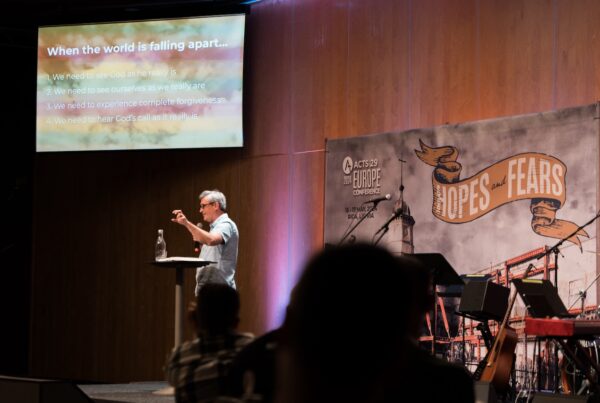When I became the lead pastor at Christ Church Kingwood with 17 people and a handful of kids, I had grand ideas of preaching people into faithfulness. I was convinced all they needed was inspired, engaging sermons to spur them on to greater evangelism, service, and hospitality. But as I prayed for this, the Holy Spirit said these crushing words: “You don’t do these things.”
I was eager to discuss evangelism but rarely engaged unbelievers with the gospel. I was great at talking about hospitality, but who we welcomed into our home was more about our preferences and desire for friendship than discipleship. I couldn’t be faithful to my people as a pastor because I wasn’t being faithful to the call of Jesus as a child of God. I wasn’t living a life worthy of imitation.
Despite my shortcomings, God is gracious. The question he’s kept before me for more than nine years of pastoral ministry is, What does a healthy pastor look like? It isn’t about our gifts or our church’s success but our lives marked by love for Jesus and rhythms of holiness and contentment.
Fight for One Another
I’ve talked with many pastors who secretly struggle with discontentment, personal failings, or the burden of success, and fall to infidelity, disqualifying pride, or doubt. We all know of pastors who have heartbreakingly committed suicide, leaving behind a family and community shocked by the tragedy. These struggles didn’t spring up overnight, yet we only find out about them once the ship has capsized. Brothers, we desperately need the very gospel we preach every Sunday. Click To Tweet
In the aftermath of a disaster, it’s painful to think tragedy could have been avoided. Fellow believers could have eased the suffering and spoken into the lies and shame. How do we do better?
The issues we face usually come down to the fundamental tenets of the gospel. We’re unhealthy when we preach outstanding sermons about Jesus but fail to apply forgiveness. We’re unhealthy when we don’t find our identity and purpose in our Savior. We’re unhealthy when our hope isn’t truly fixed in Christ’s glorious return. Brothers, we desperately need the very gospel we preach every Sunday.
We must collectively fight for health—our own and that of our friends in ministry. Something must change; pastoral health must be more than a talking point. We cannot lead or plant healthy churches without healthy pastors.
Pastoral Health Happens in Community
So, what is a healthy pastor, and how do we gauge health? A pastor’s health is evidenced in the community and confirmed through honest, humble, relational engagement. The question that’s guided and graciously haunted me ever since the Holy Spirit called out my hypocrisy is this: Do I live a life worthy of imitation?
The writer of Hebrews exhorts believers to imitate the faith of their leaders (Heb. 13:7). Paul says, “Be imitators of me, as I am of Christ” (1 Cor. 11:1). And Peter exhorts elders to be “examples to the flock” (1 Pet. 5:3).
If we’re always busy and struggling to carve out time for physical, spiritual, or emotional health, why would we expect our people to be any different? How can we exhort others to have healthy spiritual lives when we don’t? How can we challenge them to grow in their marriages when we neglect our spouses? How can we implore them to treasure Christ above all else while we’re chasing after other loves?
Pastoral health must be more than a talking point. We cannot lead or plant healthy churches without healthy pastors. Click To TweetJesus said, “Follow me,” and Paul said, “Follow me as I follow Christ.” We, therefore, are to live lives worthy of imitation. God calls us to exemplify a life of unhurried holiness for our people. We’re called to a life of disciple-making, serving, and hospitality, to demonstrate a life that loves Jesus and his gospel first and treasures God above all else—even our ministry.
How Do We Pursue Health?
Practically speaking, we must do the frightening work of letting people into our lives. We invite them into our homes and allow them to see how we love our spouses and raise our children. Let them hear about our desire for the gospel to go forth. Let our people see us pursuing Christ with all our hearts and repenting when we fall short.
We all want to foster gospel culture in our churches, but that begins in the hearts and lives of the leaders. It’s the hard, unseen, mundane work of faithfulness to Jesus that produces fruit in our ministries.
The Bible doesn't call us to efficiency; it calls us to faithfulness—a slow process directed by God, not us. Click To TweetThe result of this faithfulness may mean we’re less efficient. It may create struggles when our members know us as real people rather than our personas or performances. It may even mean we’re less successful to some. But the Bible doesn’t call us to efficiency; it calls us to faithfulness—a slow process directed by God, not us.
Let us take and plan time to do the slow things necessary to live out the gospel we preach every week. Our congregations will be healthier as they see the Holy Spirit at work in us. And we will be healthier as we rest, not in our abilities or merit, but in the sanctifying work of the Holy Spirit.











